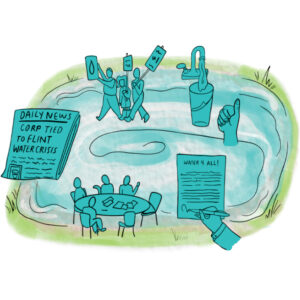As Congress drafted the 2021 infrastructure bill, lobbyists worked hard to funnel public money into corporate coffers. We discovered that the early drafts of the federal infrastructure bill framework included support for water privatization. That’s when we jumped into action, organizing people across the country and members of Congress—and achieved a major victory.
The final law earmarks over $50 billion for water infrastructure across the country—with all water privatization provisions kept out—thanks in large part to our and our allies’ organizing. This means ancient lead pipes delivering dangerous water can be replaced, and communities will have the opportunity to make improvements to their water infrastructure without turning to the false solution of privatization.
Direct line of progress
This victory builds on years of organizing that you have made possible. There is a direct line of progress from our early campaigning to today’s achievement.
In the 2000s, our Think Outside the Bottle campaign called out misleading marketing of bottled water brands that undermined public confidence in tap water. As we moved cities and states to end public spending on bottled water, we were helping lay the groundwork for the government to reinvest in water infrastructure.
In the decades that followed, we and our partners mobilized hundreds of thousands of people through our water campaign. In partnership with allies on the ground, we successfully thwarted water privatization deals in cities from Pittsburgh, Pennsylvania to Jacksonville, Florida. We partnered with Flint Rising to expose the role of water privatizer Veolia in the city’s ongoing water crisis. And through it all, we campaigned to uplift and advance public water solutions.
We and our allies also spent years moving key people in Congress to understand the harms of water privatization. We championed alternatives and public solutions, including bills like Maintaining Access to Essential Services Act and the WATER Act, which contain innovative approaches to tackling the water infrastructure crisis. And through it all, we made sure that the solutions we’re uplifting were rooted in the vision and priorities of Black movement leaders and others rooted in communities most impacted by water injustice.
Decades of building trust and expertise
Our organizing of lawmakers over the years was key to our success in stripping the bill of language supporting water privatization. In coalition with the partners and community leaders of the People’s Water Project (which we co-lead), we lobbied lawmakers across the country with whom we had already built trust and established our expertise on the issue. We made sure key members of Congress had everything they needed to keep funding for water out of corporate coffers, from resources that explained the dangers of privatization to suggested changes in drafts of the bill. Meanwhile, we also organized people around the country to contact their representatives to demonstrate public concern for privatization and support for keeping money in public hands.
And it worked! This victory is particularly notable because corporations and the politicians doing their bidding undermined many other aspects of the infrastructure law, including stripping the package of the meaningful climate action we need and opening the floodgates for privatization of transportation infrastructure.
But because we and our allies kept water privatization provisions out of the infrastructure law, billions of dollars will now be directed to public water systems, not private coffers. Communities will be able invest the funds directly in their public water systems to help ensure everyone—no matter their race or where they live—has access to safe water at affordable rates. With the bill being signed into law, we’ll continue to push for the public water funds to be allocated to and prioritized for the communities that have been historically denied these resources.
Furthermore, this historic investment is only the beginning of what communities need to provide access to safe water for all residents. Alongside you, allies, and congressional champions, we’ll continue to campaign for the long term, equitable public investments that will make this vision possible.
The central demand of our campaigning on water in the U.S. has always been clear: that the federal government must reinvest in our water systems—and reject the privatization schemes of transnational corporations. And finally, after years of organizing with hundreds of organizations, it will.



